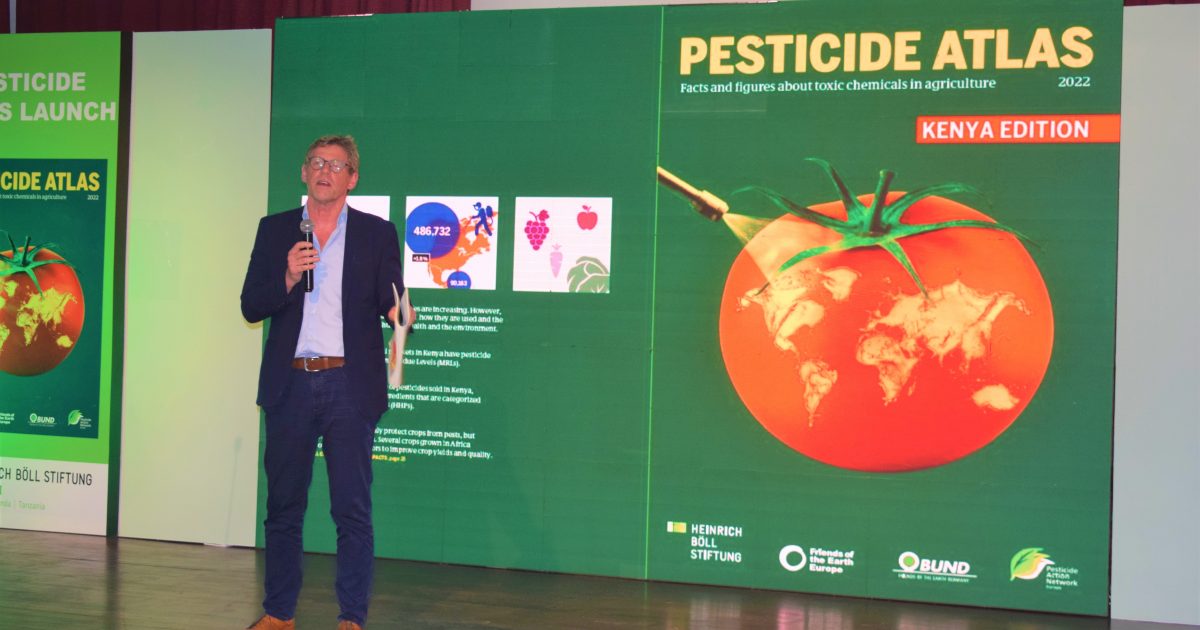A German non-governmental organization (NGO) has called for an end to the importation into the country of pesticides that have been flagged as toxic.
The Heinrich-Böll-Stiftung, affiliated with the German Green Party and operating in more than 30 countries, says statistics show 76 percent of the total volume of pesticides used in Kenya contain one or more active ingredients that are categorized as Highly Hazardous Pesticides (HHPs).
The lobby group claims such pesticides (currently banned in EU countries) have been linked to increased cases of cancer, disruption of hormonal and nervous systems and genetic defects in unborn children.
Speaking during the launch of Pesticide Plus, a publication on toxic chemicals, Heinrich-Böll-Stiftung Director Joachim Paul, says pesticides that have been outlawed in Europe are still finding their way to Africa.
“Pesticides that are not allowed for use in countries such as Germany where they are produced are still exported to other countries. In Kenya, 44 percent of the total volume of pesticides used are banned in Europe.” He said through a press statement to media houses.
“The practice of companies being allowed to sell pesticides not permitted for use in their own country because of their potential to cause high levels of acute or chronic hazards to humans and the environment, creates the double standard. In Kenya the use of these pesticides poses a great risk to farmers, local communities and all consumers and should be addressed as an urgent public health concern. Women are at higher risk due to traditional gender roles and the biological effects of pesticides. For example, there is an established link between breast cancer and certain pesticides,” adds the report.
According to the Atlas Pesticide the overall global pesticide market has almost doubled in the last 20 years.
By next year, the total value of all pesticides used globally is expected to reach nearly 130.7 billion US dollars with EU states taking the lion’s share in the number of exports.
The organization is now calling for a strict safety policy in importation and usage of pesticides in strict compliance to the approved global bodies such as the United Nations Organization.
Among recommendations by the organization include outlawing pesticides that require farmers to use personal protective equipment and adoption to biological pest control measures such as agroecology that are safe to both humans and the environment.
“In order to reduce the high number of pesticide poisonings, the World Health Organization and the Food and Agriculture Organization have developed a voluntary framework and standards for pesticide management.
Among other things, the code of conduct recommends avoiding pesticides that require personal protective equipment too uncomfortable or expensive to use. The guideline also recommends the use of agroecological alternatives and a ban on HHPs,” recommends the report.
The Heinrich-Böll-Stiftung however notes that such recommendations cannot be implemented owing to lack of legal backing.
A report by Pest Control Products Board (PCPB) and Agrochemicals Association of Kenya (AAK) two years ago showed that a total of 25 different active ingredients were found in tomato and kale samples in Kenya – 51 percent of the detected active ingredients having already been withdrawn from circulation in the EU countries. Of the samples, 60 percent exceeded the EU recommended maximum residue levels.
In August last year an environmental lobby group had called for clarity on Kenya’s position in regard to a proposal calling for the ban of some pesticides as recommended by the EU.
Greenpeace Africa while responding to calls by some farmers who are demanding for a review on the proposed ban now says there is need to review the proposal before its adoption by Parliament.
According to Claire Nasike, Greenpeace Africa Food Campaigner, there is a need for an exhaustive discussion on the subject by relevant stakeholders before the country undertakes a permanent ban on the said chemicals.
“Kenyan farmers deserve to know the truth about pesticides. The associations championing the use of pesticides have misled our farmers, who deserve the truth about toxic pesticides,’ she said.
Nasike further opined that while farmers and consumers need to be protected from harmful chemicals that have been proven detrimental to human health, there should nevertheless be right information on the matter to avoid a blanket condemnation on all inputs.
She notes that over the years Kenya’s right to safe food had been compromised after exposure to food that is high in pesticide residues and consequently banning toxic pesticides is the way to go together with encouraging farmers to embrace alternative pest control mechanisms such as integrated pest management system.
“Kenyans’ right to safe food has been compromised, after years of exposure to food that is high in pesticide residues. Banning these toxic pesticides is a step in the right direction to encourage farmers to embrace already-existing environmentally friendly alternatives, such as integrated pest management,” she added.
In 2016 the World Health Organization (WHO), while acknowledging the role played by pesticides in curbing diseases in crops, highlighted several health risks associated with their persistent use over a period of time.
The body had therefore called for thorough tests on such inputs before they could be declared safe for use by farmers.
In 2019 another lobby group advocating for sustainable agriculture had likewise pushed for the immediate withdrawal of pesticides deemed toxic to human health and the environment.
The group which had brought together the Route to Food Initiative (RTFI), Biodiversity and Biosafety Association of Kenya (BIBA-K), Kenya Organic Agriculture Network (KOAN) and Resources Oriented Development Initiatives (RODI) had raised the red flag over chemicals terming them a ticking bomb in the country’s food chain.
According to the group, at least 32 percent of pesticide active ingredients that were currently registered at the time and sold in the country had been blacklisted from the European market after being found to have serious health risks to both man and the environment.
Drawing from findings contained in the White Paper on pesticide use in Kenya and commissioned by RTFI, the lobbyists had therefore called for the withdrawal of chemicals with specific active ingredients such as permethrin, carbendazim and acephate among others.
“It is disconcerting to note that the sale of these chemicals, many of which are not approved in Europe, is going on unabated with little regard to public health and environmental safety. Our findings show that there are 24 products in the Kenyan market, which are certainly classified as carcinogenic, meaning they have the potential to cause cancer while the same number (24) are mutagenic, meaning these substances have the capacity to cause damaging genetic changes. Others have been proven to negatively affect hormones and show clear effects on reproduction,” said Layla Liebetrau, RTFI Project officer in a press statement.
According to the group the volume of imported chemicals has more than doubled from 6,400 tonnes in 2015 to 15,600 tonnes in 2018 raising fears that farmers as well as consumers might directly be exposed to highly toxic pesticides.
“Withdrawing these products from the market will reduce their availability to farmers and would be an urgent and significant step in trying to reduce the adverse effects pesticides pose to our health and food safety. The assumptions, such as ‘safe use’ and labelling, that inform whether a pesticide is registered in Europe is different in Kenya which may lead to higher exposure risk for farmers, consumers and the environment,” adds Eustace Kiarii, CEO of the Kenya Organic Agriculture Network.
Through the Pest Control Products Board (PCPB) there are 247 active ingredients registered in 699 products for horticultural use.
The White Paper further explains that there are more products than active ingredients since one active ingredient can be in different formulations registered by different companies in different products.
The active ingredient glyphosate for example, is registered in 39 products by 22 companies.
In addition, the findings show that the products registered in Kenya, that are withdrawn from the European market, are mostly sold by European companies (75 products), followed by Chinese companies (55 products) and Indian companies (16 products).
The partner organizations also allege the Kenyan Plant Health Inspectorate Service (KEPHIS) irregularly takes food samples for testing, and the actual levels of pesticides are not made available to the public, threatening public understanding about the safety of food consumed.
And in 2020 Uasin Gishu Woman Representative Boss Shollei had tabled a petition in Parliament calling for the withdrawal of lethal chemicals from the Kenyan market.
In Petition no.70 of 2019, the legislator said the move arose from findings that revealed that many of the fresh vegetables and fruits being consumed in the country could actually be a health hazard to hundreds of unsuspecting Kenyans.
She called upon the State to begin the speedy withdrawal of toxic chemicals that have been banned in Europe after being found to contain heavy residues of carcinogenic ingredients.
“As a country, we are witnessing the devastation that a terminal illness such as cancer can cause. This disease is becoming increasingly common and indiscriminately affects both our young and old; rich and poor; educated and uneducated, skilled and unskilled, urban and rural dwellers. We must question whether our food system supports or undermines the health status of Kenyans and our growing economy,” she advanced.
The former Chief Registrar of the Judiciary similarly challenged the PCBP, Kenya Plant Health Inspectorate Service, and the National Environment Authority to put checks on all farm inputs being imported into the country to weed out those that are a health hazard to the public.
“The onus is on regulators such as the Pest Control Products Board (PCPB) to ensure harmful products are not available in Kenya, and on the Kenya Plant Health Inspectorate Service and the National Environment Management Authority to ensure that pesticides in our food and environment, is monitored and controlled within acceptable limits,” she added.
Reports from the National Pesticide Residue Monitoring Programme (NPRMP) undertaken by KEPHIS, found that 1,139 food samples taken in 2018, 530 (46.53 per cent) had pesticide detections, while 123 (10.80 per cent) had exceedances of set EU maximum residue levels (MRLs).
Similarly, according to the samples collected from edible greens, kales, peas and capsicum had the highest pesticide residue detections at 94.40 per cent, 75.84 per cent and 59.18 per cent respectively according to KEPHIS Annual Report and Financial Statements for the Year Ended 30th June 2018.
By Samuel Maina





